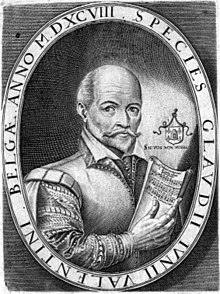Académie de Poésie et de Musique
The Académie de Poésie et de Musique (
Overview

The purpose of the Académie was to revive
Although the ostensible purpose of the Académie was musico-poetic, Baïf's goals were much more ambitious – he hoped that through a structuring of French poetry, he might bring about a more structured social order and morality. This goal followed from Neo-Platonic ideals, where music and morality are closely linked. To this end, discussions were not limited to music and poetry, but also included discussions of Natural philosophy, mathematics, and other subjects. Baïf was influenced at least in part by the Accademia Platonica of Marsilio Ficino in Florence. Other influences on the creation of the Académie were the teacher and poet Jean Daurat, Pierre de Ronsard, and other members of La Pléiade, a literary group.[1]
Despite Baïf's goals of spreading his philosophy, the Académie kept the art of measured poetry and music a secret.[4]

In order to help further his goals, Baïf enlisted the help of French musicians, the most influential of whom was
When Charles IX died, the Académie became far less active. It had a renaissance for a short time under
References
- Notes
- Sources
- Brown, Howard Mayer; Iain Fenlon (2001). "Academy 4. French academies.", Grove Music Online, ed. L. Macy (accessed March 18, 2007), grovemusic.com Archived 2008-05-16 at the Wayback Machine(subscription access).
- Dobbins, Frank (2001). "Jean-Antoine de Baïf", Grove Music Online, ed. L. Macy (accessed March 18, 2007), grovemusic.com Archived 2008-05-16 at the Wayback Machine(subscription access).
- Fremy, Édouard (1887). L'Académie des derniers Valois : Académie de poésie et de musique, 1570-1576, Académie du palais, 1576-1585, d'après des documents nouveaux et inédits. Paris: Ernest Leroux.
- ISBN 9780415002219.
External links
- (in French) Larousse

